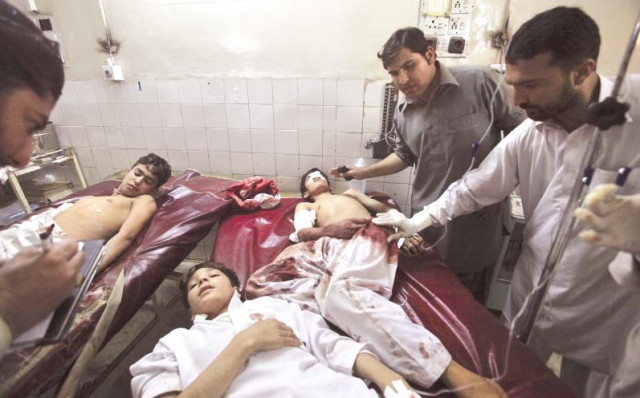The Taliban’s shameless enterprise
The Taliban have taken to killing children because they are getting desperate.

The van was attacked with rocket launchers, hand-grenades, and Kalashnikovs, and the mayhem continued for 10 minutes, till the school van was pulverised. Instead of apologising for targeting children by mistake, a TTP spokesman proudly announced that his warriors had done this as revenge for locals raising an anti-Taliban lashkar. Now is the time for a rethink for those who believe that the Taliban are good people but have been provoked by Pakistan’s folly of allying itself with America in the latter’s war on terror. Now is the time to come out and unequivocally call a spade a spade and curse the TTP as an outfit of heartless criminals.
The TTP, based in Darra Adam Khel near Kohat but operating in Khyber, too, had earlier claimed that they targeted teachers and older children to teach Pakistan a lesson for organising lashkars from among the local population to fight the Taliban. But the children in the school van that the Taliban warriors killed were less than ten years old, and there is hardly any sign that the government is arming the common man to fight the Taliban. In fact, there is much evidence to suggest that the military is not all that keen in arming civilians and organising them as private lashkars to fight the militants. There is evidence too that some attacks by the Taliban on lashkars could have been prevented but that the establishment chose to stand by the side and do nothing.
The politicians need to come together and denounce the Taliban and to tell those who aspire to win the 2012 elections that they can no longer call the Taliban innocent tribesmen provoked into violence by Pakistan’s wrong policies. It is unfortunate that the TTP and its master al Qaeda have been destroying girls’ schools and attacking mosques during prayers in Ramazan without so much as a flutter of disapproval from our political parties.
The truth is that the Taliban have taken to killing children because they are getting desperate. Their support among the people is shrinking and there is nothing but coercion in their arsenal that will persuade people to accept their control over their lives. They are also increasingly using women as suicide bombers, which may suggest perhaps that they are running out of men, and they are increasingly kidnapping people to top up their coffers. Of course, they are still active because the state of Pakistan has lost its writ in many parts of the country, because its politicians are quarrelling with one another and there is much reluctance by those who matter to take the fight to the Taliban.
The Taliban will stick around as long as the state of Pakistan is weak. However, to come out of its doldrums, Pakistan needs to approach the world with a new non-isolationist face, through its foreign policy. It can effect radical changes in its foreign policy to relieve the pressure of isolationism, thus opening the door for broad-spectrum assistance from the international community. Foremost, in this respect is Pakistan’s ‘normalisation’ of relations with its neighbours.
In a number of ways, Pakistan’s internal disorder stems from its handling of its foreign policy in the region. This has happened mostly through actions taken by its embedded non-state actors across the national frontier. The situation demands that Pakistan reach out to its neighbours and pledge cooperation with them, if only to disarm the suspicion that Pakistan may be acting behind the non-state actors. This will isolate the Taliban and their master al Qaeda and open the door for the much-needed financial help.
Published in The Express Tribune, September 15th, 2011.














COMMENTS
Comments are moderated and generally will be posted if they are on-topic and not abusive.
For more information, please see our Comments FAQ